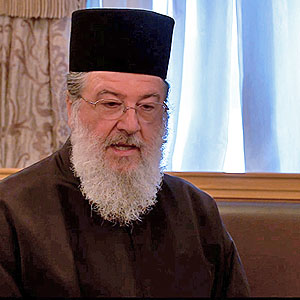The Church without Saints isn’t the Church – 3
27 October 2015I would like to express my warmest thanks to Archimandrite Ieronymos Nikolopoulos, Chief Secretary to the Holy Synod and Parish Priest of this church, for his kind invitation to address you during Vespers on this most important day for the Orthodox Church, which is also of great significance for this parish, since it honors the memory of one of its former priests, Saint Nikolaos Planas.
***
Our contemporary saint, Luke, Bishop of Simferopol, the surgeon and wonder-worker, who was persecuted so harshly by the atheist establishment, reached the point of saying: ‘I came to love the suffering, which cleanses the soul in such a strange way’. Saint Porfyrios, who suffered so much from his various illnesses, said: ‘I never asked the Lord to take away my sicknesses. I’d have been ashamed to do so’. He had such spiritual nobility that, in his pain, he glorified God and was happy. And Saint Païsios said: ‘God’s hung our salvation on patience’. Towards the end of his life, when he was suffering horrific pains from his cancer, he said: ‘the benefit I’ve seen from my illness I never saw from years of asceticism’. And before him, Saint Nikolaos Planas, whom we’re honoring, confessed to one of his spiritual daughters: ‘My child, it was because of patience that I managed to make it through all the obstacles that presented themselves’.
These basic features of a holy life were held in abundance by Saint Nikolaos Planas, though there were also others, peculiar to him, because of the manner of his personal struggle and his priestly office. As regards the first feature, he didn’t allow himself to stray from precise observance of the law of the Gospels.
Although not well-educated, to the extent, in fact, that he made comical mistakes when he read the Gospel, according to the great Greek writer Papadiamantis, who used to sing at the vigils in Saint Elisha’s. Nevertheless, he studied the Scriptures with his spiritual children, as is written: ‘your law is the object of my study’. There’s even a photograph that has survived. And it must be stressed that his lack of education wasn’t an obstacle, because it’s the enlightenment of the Holy Spirit that makes theologians out of fishermen, such as the Apostles. What happened to them after the Resurrection – ‘then He opened their minds so they could understand the scriptures’- has occurred throughout the centuries as a sign from God for those who love Him and seek to know ‘the will of God’. Papa-Nikolas never preached a sermon. He had some physical speech impediment. Moses also had a similar problem, but God chose him for the great task of the Exodus and gave him the Law in Sinai. And he saw God.
So Papa-Nikolas never preached, but he was himself a continuous sermon which bore great fruit. This practical sermon, that is his life, endured. It endured because it was the sermon of a holy life, and, as a sermon accompanied by the grace of God, was aimed directly at people’s hearts, and brought them ease and inspiration.
As regards the second feature, the voluntary withdrawal from the world, it was obvious and self-evident, if we read the written testimony regarding his life. A holy priest who was a stranger to the worldly outlook couldn’t help but be indifferent to material goods, especially money. He had no possessions, wasn’t avaricious and so was generous. But he was also indifferent to censure and praise, because his mind, his heart, were in heaven.
As regards his attitude towards the Church, this is proven by his extremely humble obedience, even when the powers that be were less than fair to him. Most of all though, in his attitude towards the calendar question, he wasn’t swept away by ignorant zeal.
As regards the fourth feature, that is fortitude in enduring the various sorrows of life, he was magnificent in his peace and tolerance.
[to be continued]
* Talk given in the church of Saint John the Baptist (Kinigos) in Vouliagmeni Street, Athens, on 1/3/2015 at Vespers on the Sunday of Orthodoxy, the eve of the Feast of Saint Nikolaos Planas.







